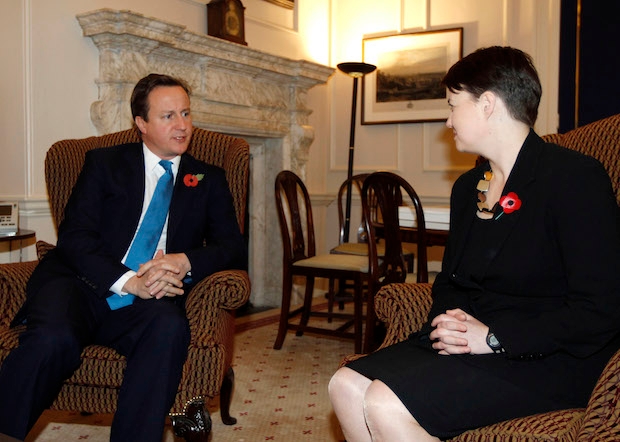Today’s Scottish Conservative conference in Edinburgh proved unexpectedly interesting. No, really. Or, rather, yes, really. Or whatever. David Cameron spoke, you see, and so did Ruth Davidson and they said very different things. For important Prime Ministerial timetabling reasons (ie, he needed to get back to London) Cameron spoke first and thus, unusually, served as the warm-up guy. Which merely helped emphasise the difference between what the Prime Minister said and what the Scottish Tory leader had to say.
Some of this was a question of substance.Cameron declared that the national question is “settled” whereas Davidson warned that “This isn’t over and it hasn’t gone away”. Only one of them can be right and it’s not the Prime Minister. The thing is, you see, that English Tories evidently want the SNP to take as many Labour seats in Scotland as possible. By contrast, the Scottish party increasingly thinks the SNP, not Labour, are the biggest enemy they face. Plenty of delegates attending this conference confessed they are prepared to vote Labour in May.
So much for that. Just as interesting – for some of us, anyway – was the manner in which Davidson tried to establish the idea that her Tory party was very different from the Tory party so many people so dislike. “I’m not in this for the people who’ve already made it in life” she said and it was hard to avoid the thought that here was a product of Buckhaven High School dumping on a product of Eton College.
A senior Scottish Tory confirmed this. The “posh boys” can’t be in charge forever, I was told. There are other kinds of Conservative and they can speak to a broader range of opinion – in Scotland as well as in Wales and England – than can Messrs Cameron and Osborne. The posh boys, by this analysis, are holding the party back. Not deliberately, of course, and they mean to do their best (bless) but unavoidably and perhaps even fatally.
Davidson told delegates – and by extension the wider electorate – that “You deserve a fair break”. There were obvious echoes of Thatcher but something deeper and broader than that inheritance too. It made me think of Teddy Roosevelt’s promise of a “square deal” for the ordinary guy, it made me think of the New Zealand concept of “a fair go” and it reminded me that in other parts of the English-speaking world blue-collar Conservatism has proved startlingly successful.
So, sure, Ruth Davidson embraces tax cuts but she does so because she doesn’t believe government should treat taxpayers as a cash machine. She also proclaimed a faith in freeing schools from local authority control and for giving parents vouchers to purchase childcare from whatever provider best suits their particular circumstances. Most interestingly, perhaps, she promised that small businesses that paid the living wage should receive tax credits to offset their increased costs. Good for the low-paid; no penalty for business. A kind of aspirational compassionate Conservatism, if you will.
Some journalists present sniffed that her speech was perfunctory and uninspiring. Perhaps. But it was interesting, too. Which seems more important, frankly. It was a speech designed to appeal to the aspirational working class and the petit-bourgeoisie. The rich, after all, will be fine. But let’s give more people the chance to make the most of their lives. Government has a role to play in that even if it is also the case that government must often get out of the way.
Background matters, you see. David Cameron can make the argument that welfare and educational reform benefit the poor more than anyone else but the sorry truth is that many people have no desire to hear that message coming from a leader who looks and sounds the way he does. Unfair? Indubitably. The way it is? Hell, yes.
Davidson is not the only “New Tory” of this type. Stephen Crabb, the Secretary of State for Wales, and Sajid Javid, the Culture Secretary, are others. They look and sound much more like this country’s fabled ordinary hardworking families than either Cameron or George Osborne.
When the latter pair talk of such people it can often be hard to banish the thought there’s something desperately – if unwittingly – condescending about such chat. You need not agree with the likes of Davidson, Crabb and Javid to appreciate they have some greater understanding of, and purchase upon, the way most people actually live.
It won’t be enough to transform Scottish Tory fortunes – three seats in May would be reckoned a super-super result – but it points a way and illuminates a path towards a longer-term recovery. One that wins arguments even if it cannot yet count on votes. One that helps remove the most toxic stain that besmirches the Tory countenance: that it is the party for the rich and the smugly well-off.







Comments